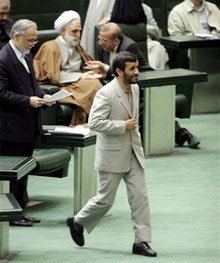Iran warns of response to nuke sanctions
(AP)Updated: 2006-10-31 14:25
TEHRAN, Iran - Iran's firebrand president warned on Monday that his country would respond with an "appropriate and firm response" to any UN sanction over its nuclear program.
The comments by Mahmoud Ahmadinejad came as key United Nations Security Council members were considering a draft European resolution that would impose punishing measures on Iran over its disputed nuclear program.
 Iranian President Mahmoud Ahmadinejad makes his way to speak in an open session of parliament to debate his nominee as minister of Social Welfare in Tehran, Iran, Sunday, Oct. 29, 2006. [AP]  |
"The Iranian nation will respond to restrictive activities with an appropriate and firm response," he said without elaborating.
Meanwhile, Mohamed ElBaradei, who heads the International Atomic Energy Agency, said at the UN that his organization has not been able to verify that Iran's nuclear program is peaceful.
Tehran insists its nuclear efforts are solely geared at peacefully producing electricity. But the US and its allies fear Iranians want to build atomic weapons.
Russia and China, which wield veto power as permanent Security Council members, have shied away from imposing punitive measures on their trade partner Iran, saying they prefer a diplomatic solution to the impasse. But the United States says the proposed sanctions are not tough enough.
Russian President Vladimir Putin told Ahmadinejad on Monday that Moscow strongly favors further negotiations on Tehran's nuclear program, the Kremlin said.
The brief Russian statement after a telephone conversation between the two leaders was the latest indication that Russia opposes sanctions against Iran and believes the international community should try to defuse tension through talks.
With Iran waving threats of a firm response to any UN sanction, it also appeared aimed at cooling Tehran's rhetoric and casting Russia as a peacemaker.
In the Iranian-initiated conversation with Ahmadinejad, "Putin outlined the fundamental position of the Russian side in favor of a continuation of the negotiation process," the Kremlin said.
President Bush insists that Washington will only agree to negotiate about Tehran's nuclear program if the Iranians first halt uranium enrichment, a key step to produce either peaceful nuclear power or an atomic bomb.
With the council divided, Ahmadinejad remained defiant, telling the crowd that Iran would prefer to endure sanctions rather than bow to Western pressure.
"We want to stand on our own feet," he said. "You should know that our nation will not give in one iota in the nuclear case."
He also mocked Britain as a "follower of arrogance," for aligning itself with US foreign policy, days after British Prime Minister Tony Blair called on the Security Council to achieve a "proper, binding resolution" on Iran's nuclear activities.
The British "have simply become the guide for a blind U.S," Ahmadinejad said.
"We do advise Britain not to squirm and not to do childish activities concerning the resolution. Iran's nation has stood up and will not let you achieve anything except humiliation," he added.
His speech was delivered after Iran officially confirmed on Friday that it has doubled its uranium enrichment capacity.
On Monday, ElBaradei said that the IAEA was "unable at this stage to confirm the peaceful nature of Iran's nuclear program which, obviously, is a matter of serious concern."
ElBaradei referred to his earlier report to the Security Council verifying that Iran had ignored the Aug. 31 deadline to halt uranium enrichment.
The UN nuclear watchdog had not been able to "make progress resolving the outstanding issues — issues that require certain transparency measures on the part of Iran," ElBaradei said.
The Iranians have insisted on their right to pursue a peaceful atomic energy program as a member of the Nuclear Nonproliferation Treaty.
Iran's deputy UN Ambassador Mehdi Danesh-Yazdi criticized the "dangerous trend" where countries outside the Nuclear Nonproliferation Treaty face no pressure to join and acquire large stockpiles of nuclear weapons. He singled out Israel, accusing it of leading "a masquerade of lies and deception against Iran's peaceful nuclear program."
Iran wants all nuclear weapons eliminated but in the interim the international community should take "all necessary steps to ensure universality of the non-proliferation regime," he told the UN General Assembly.
At the same time, Danesh-Yazdi said, Iran has a right under the NPT to
nuclear technology and is ready to resume negotiations with the six key powers
that proposed a package of incentives to assure them of the peaceful nature of
Iran's nuclear program. But he made no mention of suspending uranium enrichment
— a key demand of Britain, France, Germany, the US, Russia and China for
resuming negotiations.
|
||
|
||
|
|